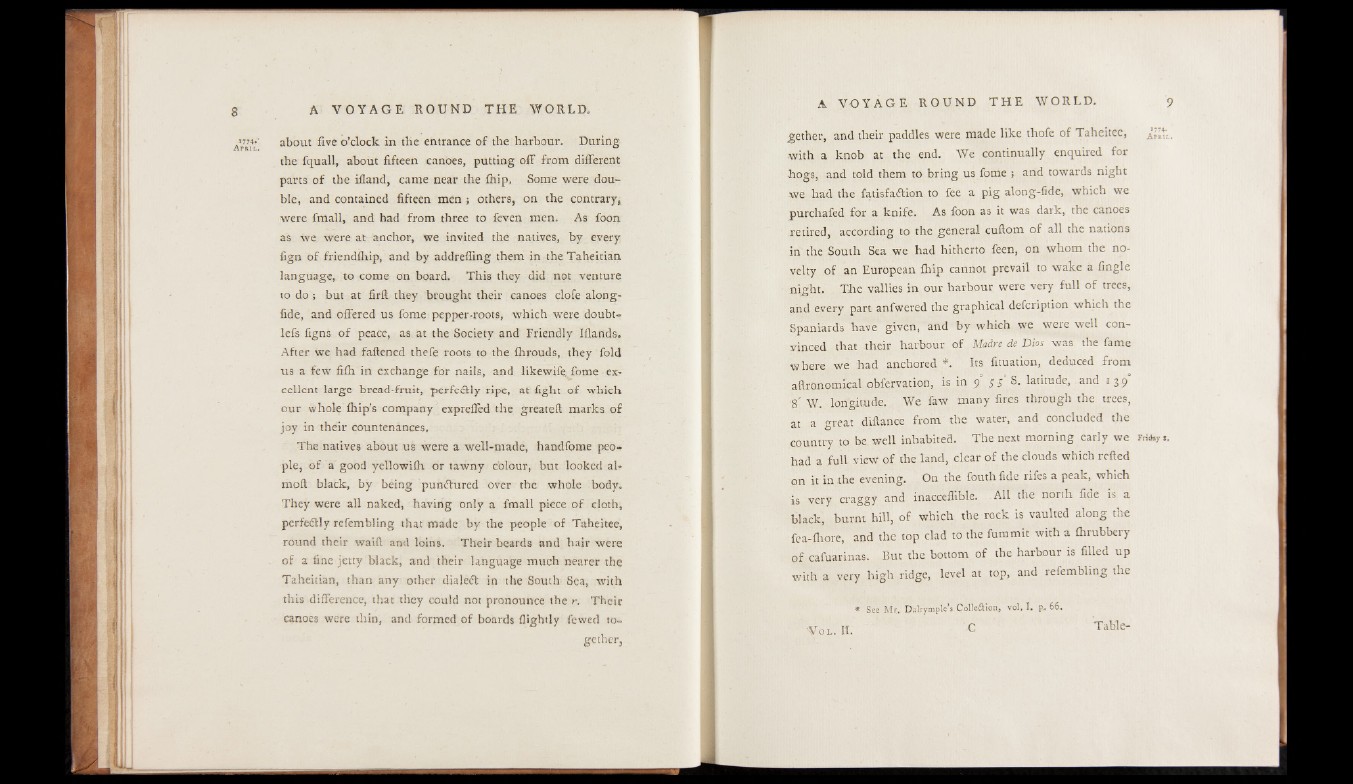
'774.' about five o’clock in the entrance of the harbour. During
the fquall, about fifteen canoes, putting off from different
parts of the iiland, came near the fhip. Some were double,
and contained fifteen men ; others, on the contrary,
were fmall, and had from three to feven men. As foon
as we were at anchor, we invited the natives, by every
fign of friendfliip, and by addrefling them in the Taheitian
language, to come on board. This they did not venture
to do ; but at firft they brought their canoes clofe along-
fide, and offered us fome pepper-roots, which were doubt-
lefs figns of peace, as at the Society and Friendly Iflands,
After we had fattened thefe roots to the fhrouds, they fold
us a few fifh in exchange for nails, and likewifevfome excellent
large bread-fruit, perfectly ripe, at fight of which
our whole fhip’s company expreffed the greateft marks of
joy in their countenances.
The natives about us were a well-made, handfome people,
of a good yellowifli or tawny c'olour, but looked al-
moft black, by being punctured over the whole body.
They were all naked, having only a fmall piece of cloth,
perfectly refembling that made by the people of Taheitee,
round their waift and loins. Their beards and hair were
of a fine jetty black, and their language much nearer the
Taheitian, than any other dialed! in the South Sea, with
this difference, that they could not pronounce the r. Their
canoes were thin, and formed of boards flightly fewed together,
gether, and their paddles were made like thofe of Taheitee, a««..
with a knob at the end. We continually enquired for
hogs, and told them to bring us fome ; and towards night
we had the fadsfadtion to fee a pig along-fide, which we
purchafed for a knife. As foon as it was dark, the canoes
retired, according to the general cuftom of all the nations
in the South Sea we had hitherto feen, on whom the novelty
of an European fhip cannot prevail to wake a Angle
night. The vallies in our harbour were very full of trees,
and every part anfwered the graphical defcription which the
Spaniards have given, and by which we were well convinced
that their harbour of Madre de Dios was the fame
where we had anchored *. Its fituation, deduced from
aftronomical obfervation, is in 9 55 S. latitude, and 139
8' W. longitude. We faw many fires through the trees,
at a great diftance from the water, and concluded the
country to be well inhabited. The next morning early we Friday j.
had a full view of the land, clear of the clouds which retted
on it in the evening. On the fouth fide rifes a peak, which
is very craggy and inacceflible. All the north fide is a
black, burnt hill, of which the rock is vaulted along the
fea-fhore, and the top clad to the fummit with a fhrubbery
of cafuarinas. But the bottom of the harbour is filled up
with a very high ridge, level at top, and refembling the
* See Mr. Dalrymple’ s Colleflion, vol. I . p. 66.
V ol. II. 'C Table